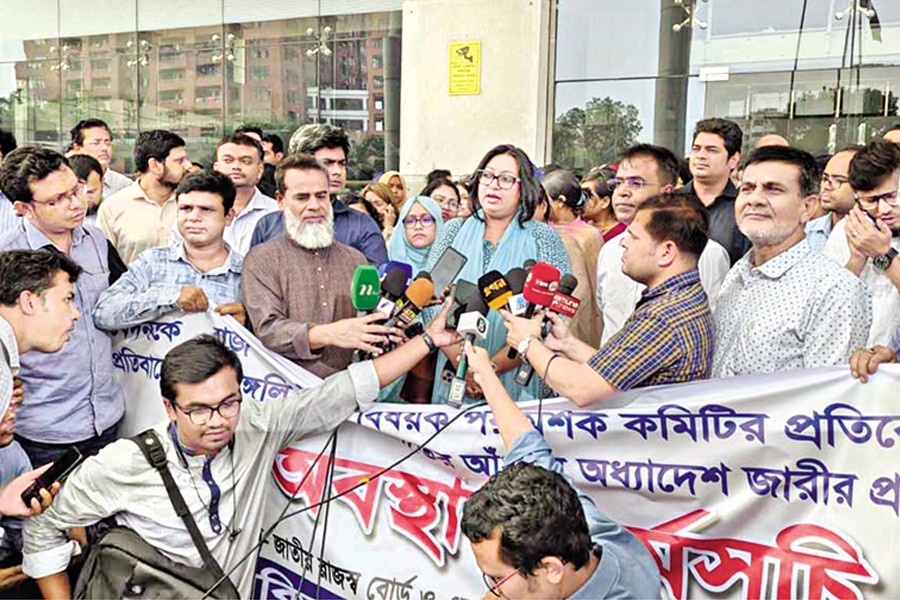
Published :
Updated :

A midnight decision dissolving the National Board of Revenue into two entities triggers raucous protests as NBR staffers threw a three-day nationwide pen-down strike in revenue offices, while the government and economists termed it a "welcome move".
A newly issued ordinance also provided for abolishing the Internal Resources Division (IRD), evidently following recommendations from international development financiers and noted economists as a measure for streamlining the revenue sector and raising Bangladesh's tax-GDP-ratio.
The reform step is taken to improve efficiency, reduce conflicts of interest, and widen tax base, the CA Office said Tuesday in an explanation, citing a total of 10 reasons.
Sadhan Kumar Kundu, Additional Commissioner (Customs and Excise) of the NBR, made the announcement of work abstention during a sit-in organised Tuesday by the NBR Reform Alliance (NBR Sanskar Oikya Parishad) in front of the NBR Bhaban in Agargaon, Dhaka.
"The strike will be observed at all NBR offices nationwide, including tax zones, VAT commissionerates, and customs stations," said Kundu.
However, services related to international passenger movement, export activities, and preparation of the national budget for the next fiscal year have been exempted from the protest "to avoid disruption to critical operations", he added.
The strike will be observed from 10am to 1.0pm on Wednesday (today), and from 10am to 3.0pm both on Thursday and Saturday.
The Legislative and Parliamentary Affairs Division of the Ministry of Law, Justice and Parliamentary Affairs issued the gazette of the 'Revenue Policy and Revenue Management Ordinance 2025' on Monday midnight.
Once the ordinance is implemented, the Internal Resources Division (IRD) will be abolished, and two new divisions under the Ministry of Finance will be created-namely, Revenue Policy Division and the Revenue Management Division.
All of the human resources of the NBR will be entrusted with the Revenue Management Division according to the new ordinance.
Earlier on April 17, the Advisory Council of the interim government approved the draft ordinance on the splitting of the NBR into two entities.
Although the ordinance was expected to be promulgated shortly after completing the remaining formalities, it sparked outrage among officials of the Income Tax and Customs cadres after the ordinance published.
Officers from both groups have since demanded its immediate withdrawal.
Former lead economist of World Bank's Dhaka office Dr Zahid Hussain terms the government decision to create revenue policy and revenue management wings a "welcome move" as he thinks the recast would ensure balance between the two entities.
He mentions that economists, think-tanks and development partners had recommended such separation over the last couple of decades. Besides, the taskforces and the whitepaper committee formed by the interim government also gave their opinion in favour of such bifurcation.
"Bangladesh would require reducing its dependence on indirect taxes such CD, SD and VAT to pursue negotiation with the Trump administration and also its preparation for LDC graduation," he told The Financial Express.
"So, creation of a "strong revenue policy division" would certainly pave the way for achieving the goals."
However, he notes that secretaries and top officials of the newly proposed divisions would be appointed on the basis of capability, not on consideration of which cadre they have come from.
"So, agitations launched by the NBR officials have no valid grounds," he says.
Around 4:30pm on Tuesday, over a thousand officials and employees gathered on the NBR premises to join in the protest programme.
Just moments earlier, NBR Chairman Md Abdur Rahman Khan had left the building and departed in a car, prompting loud chants of 'fake, fake' from the crowd.
During the demonstrations, leaders of the NBR Reform Alliance questioned the secrecy surrounding the advisory committee's report and whose interests the ordinance serves.
They criticised the government for not consulting civil society, businesses, or economists before deciding to dismantle a decades-old revenue institution.
Protesters alleged a bureaucratic power grab under the guise of reform, warning it could destabilise revenue collection ahead of the national budget.
While donors like the IMF recommended separating policy from administration, they noted none called for dismantling the NBR. They demanded justification for how the move would enhance revenue efficiency or support trade.
Asked whether the splitting of the National Board of Revenue (NBR) into two divisions will have any impact on revenue collection, Finance Adviser Salehuddin Ahmed at a function on Tuesday answered in the negative, citing international practice of such bifurcation.
Meanwhile, the office of the Chief Adviser issued a clarification on Tuesday which includes 10 points in favour of the new ordinance.
Officials said the International Monetary Fund (IMF) first recommended separating the National Board of Revenue's policy and administrative functions in 1993, while the World Bank reiterated the call in 2007
In recent years, the business community, macroeconomic analysts, and international development partners have increasingly urged the government to recast the NBR structure.
Their recommendation has been to separate fiscal policy from fiscal management for greater efficiency and transparency.
Following the change of power on August 5, the interim government initiated a broader reform drive targeting various institutions and administrative systems.
As part of this initiative, the Internal Resources Division (IRD) formed a five-member advisory committee to explore reforms within the NBR.
The committee included two former NBR chairmen from the administration cadre and two former members from the customs and income tax cadres-representing the relevant expertise.
In December, the committee submitted a report to the Finance Adviser, recommending the creation of two distinct entities: Revenue Policy Division and Revenue Management Division.
In addition to condemning the proclamation of the draft ordinance "without consulting key stakeholders", NBR officials and employees also expressed frustration over what they said lack of transparency, as the contents of the ordinance were not made public.
jahid.rn@gmail.com


 For all latest news, follow The Financial Express Google News channel.
For all latest news, follow The Financial Express Google News channel.